Navigate the Loopholes, Not the Wormholes, to Raise Your Credit Score
If your credit score needed a significant boost, would you know to do that? There are ways to raise your credit scores without throwing your money through an intergalactic wormhole and possibly causing further damage.
In this post, let's examine a particular loophole that can work in your favor when you need a credit score boost. We will first look at how confusing and time-consuming this can be and then show you to raise your credit score.
What to Look For in Your Credit Report
Once you have obtained a copy of your credit report, the real work begins. Finding the items that can hurt your credit score will be in plain sight if you know what to look for.
Let's look at the five most detrimental issues that can destroy your credit score.
- Charge-off
Let 's say that for whatever reason, you missed a few payments on a credit card or other entity that had extended credit to you. Once these missed payments reach a certain point, usually six months, the creditor will list the account as a charge-off meaning that the account has been closed, but you still have the balance of the account showing as being delinquent.
These types of red flags are usually the most common types of negativity found in a credit score, and they will remain as such for seven years, even if you somehow manage to pay the balance off.
- Debt Collections
The creditors responsible for earmarking your account as a charge-off will sometimes hire an outside third party to collect that debt. When these companies recover money for their client, it also has a much more negative impact on your credit score because, in addition to the charge-off, you now have debt collections.
- Bankruptcy
Sometimes it can 't be helped, and you need to file for bankruptcy. These court-ordered discharged debts may give you some breathing room, but the damage will follow you for up to ten years.
- Foreclosure
Foreclosure is a double-edged sword. Not only does the mortgage on your home get foreclosed on, and you lose the home, most if not all banks will never loan any money to someone with a foreclosure regardless of how much time has passed.
- Repossessions
These, too, are two-sided affairs. Even after your car or other property has been repossessed, you can go to lenders and borrow money again, but at a substantially higher interest rate costing you thousands in interest charges.
Besides having these types of entries on your credit score, you can also become victimized by someone else with the same name. Oftentimes these issues take the longest to clear up as the process of proving your identity can take a lot of time in court.
These credit score lowering issues can destroy your ability to borrow money and cause other issues in your life, including depression and anxiety. There is a better way.
Trying to Dispute Incorrect Items on Your Credit Report Alone
You may very well be part of the 25% of the U.S. population that has issues within their credit report that are not accurate. If you find an error on your credit report, it's up to you to go through the necessary steps to correct the issue.
Let's look at those steps now.
| Find the errors | Choose an authoritative credit reporting agency to see your credit report and then be aware of problems with personal information, account information, items charged without your approval (identity theft), items reported more than once, and resolved issues that were never cleared up. This will take some time to review all creditors. |
| Contact the credit provider. | Document all your report issues and send that information to the agency where you obtained your credit report. These providers are not the same as the credit bureau, but they need to be made aware they are reporting information that is not correct. |
| Letter of the issue | Send a letter of the issue to each of the three credit reporting bureaus. Equifax, Trans Union, and Experian will each need a letter reporting the problem. You will need to file three letters per incident. In your letter to these bureaus, be sure to include the File Identification Number (FIN) of the report, your social security number, the item being disputed, and your contact information. This, too, will take some time. |
| Response | Wait for a response. These agencies are not going to set any speed records in looking at your dispute. Your time is worth way more than that. |
There is a loophole that you can attempt on your own.
Using the Section 609 Loophole to Raise Credit Scores
The Fair Credit Reporting Act (FCRA) Section 609 refers to a specific letter that can be sent on your behalf to dispute allegations made to your credit report in error.
This particular way of disputing a credit issue simply takes advantage of certain language that protects your rights as a consumer. In essence, if the information you are questioning cannot be confirmed or verified, then by law, it must be removed from your credit score.
Now let's get someone busy working on your behalf to take advantage of FCRA Section 609.
How to Use DoNotPay to Take Advantage of Loopholes to Raise Credit Scores
DoNotPay was designed to level the playing field and make issues like the ones with your credit report fast and easy, not confusing and time-consuming.
How to clean up your credit report using DoNotPay:
If you want to clean up your credit report but don't know where to start, DoNotPay has you covered in three easy steps:
- Search Clean Credit Report on DoNotPay.
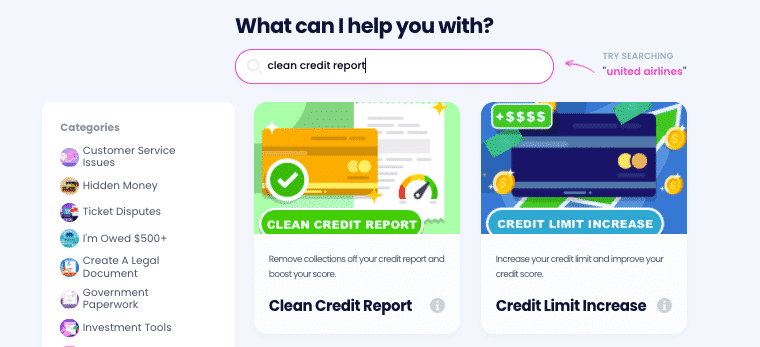
- Prepare a recent copy of your credit report that you can use as a reference.
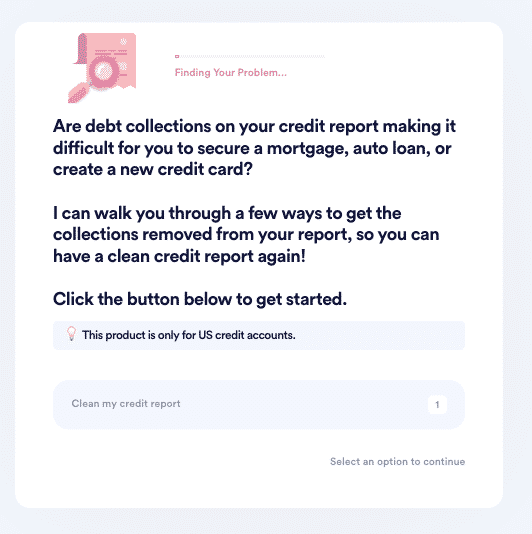
- Let us guide you through the four potential options:
- If you've already paid off your debt, we'll help you file a Goodwill Removal Request to get it removed.
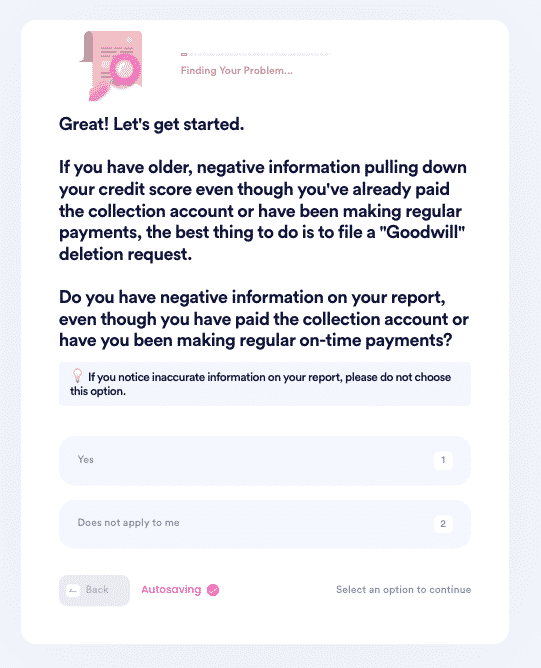
- If you notice any errors in your report (we have a list of common errors you can use), we'll help you file a credit dispute to the creditor or major credit bureaus.
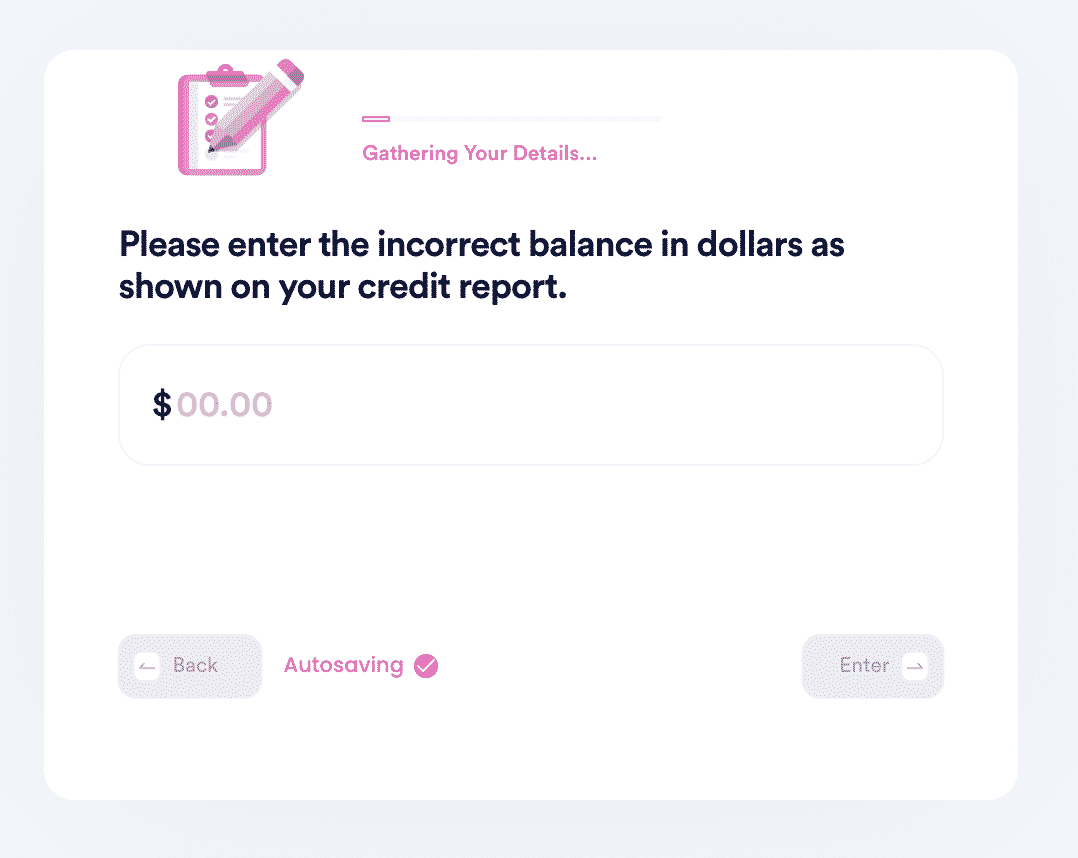
- If there are no errors, we'll check if you're still eligible to file a debt validation request. If they can't validate your debt, they're required to remove it from your report, and they can't collect it.
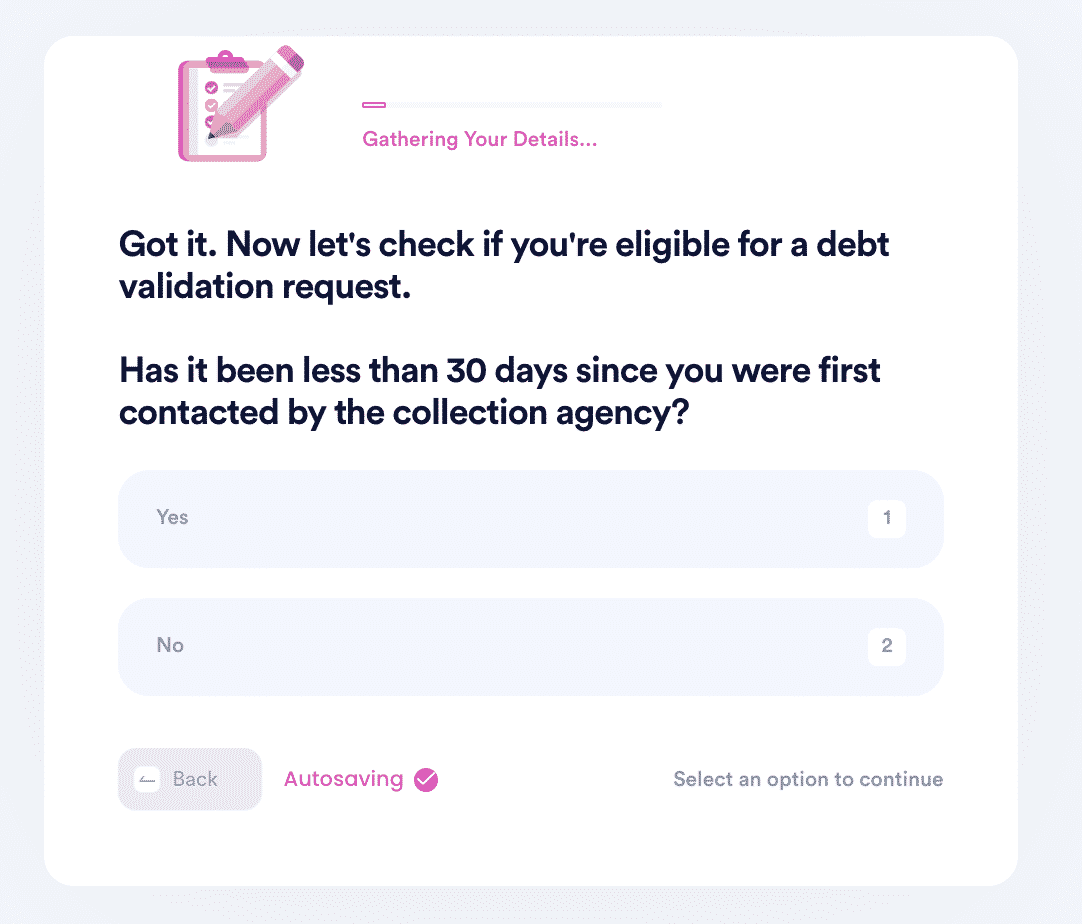
- Lastly, if none of the above options work, we'll help you file a pay-to-delete negotiation letter. You can customize the amount you are willing to pay in exchange for getting the item removed.
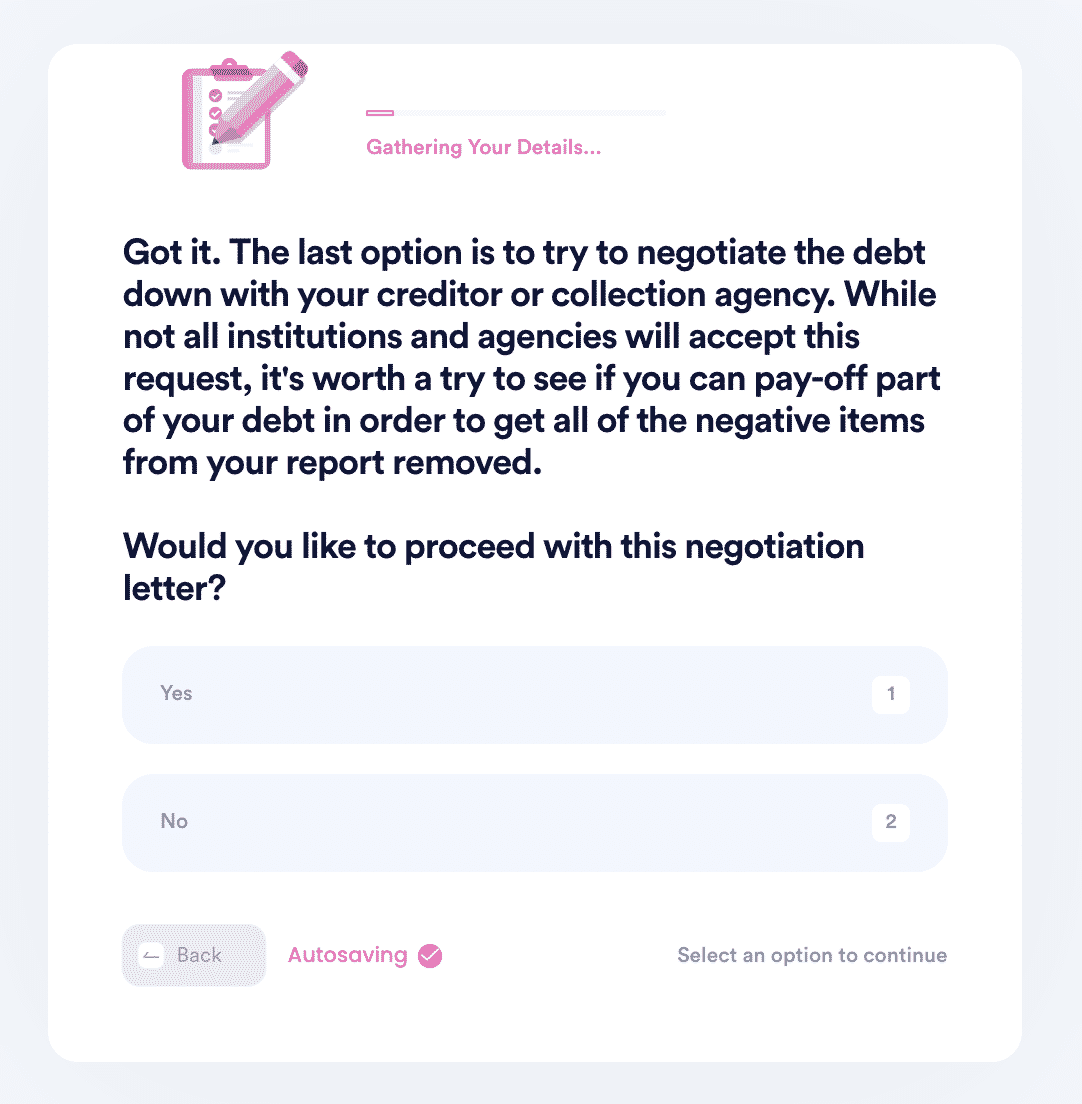
And that's it. Spend your time planning your victory party when your fresh credit report comes out, not chasing down information for the three credit bureaus.
Why Use DoNotPay?
DoNotPay is your one-stop information hub for credit score issues. Look at these reasons that you can trust the team from DoNotPay.
DoNotPay is:
- FAST
- EASY
- SUCCESSFUL
With a few answers to some basic questions, your credit score issues can quickly become another DoNotPay success story.
What Else Can DoNotPay Do?
Assisting you in taking advantage of certain is just the beginning.
Look at these other issues you can successfully navigate using DoNotPay.
- Learn how to improve credit scores
- Learn more about disputing credit reports
- Learn about debt validation letters
- How to remove collections from a credit report
- Learn about credit dispute letters
- How to remove late payments from credit reports
- How to fix a credit score
- How to remove credit inquiries from your credit report
Let DoNotPay show you how easy it can be to to raise your credit score.
 By
By